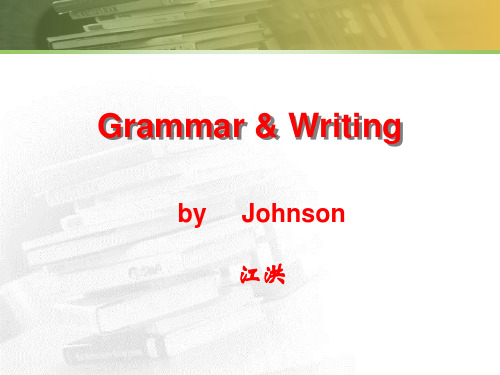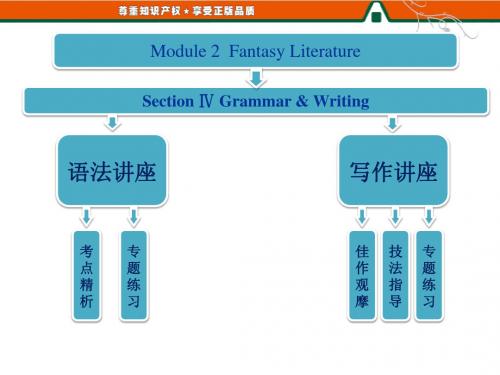Grammar and Writing 1 基本句型
- 格式:docx
- 大小:485.32 KB
- 文档页数:2

Unit One GreetingObjectives:By the end of this unit, the students should be able to:1) read, discuss and translate business cards in English,2) learn some expressions used in greeting and introducing people,3) comprehend the two passages and master the useful expressions in them,4) finish the exercises by themselves or with some help.IntroductionLead-in(导入):First, the students are asked to talk about how to greet and introduce people. Then their opinions are written down on the blackboard. Finally, the introductory remarks will be made by the teacher as follows:In social interactions, greeting and introducing people are very important. An appropriate introduction will help you leave a good first impression upon others, which means you may be likely to establish a close relationship with others, and vice versa. When you are introduced to foreign friends, you should greet them with “How do you do?" while shaking hands with them for a few seconds. The next thing is, perhaps, the presenting of a business card, which is also called a name card. You should accept the card with a smile and a quick browse, and at the same time, offer yours.Unit One Part I Section I. Warming up & Reading I.Presentation: Make a brief self-introduction, introduce how to study English in collegeII.Warm-upBusiness cards are very useful for introducing people. Now let's read the following business cards.Sample 1 Sample 2 on bookSome useful expressions (refer to the Data Bank in the Work Book)III.Read the passageAsk the students to skim the passage.IV.Analyze the passage, and explain the language points and difficult sentences.(In this step, some related information will be provided for the students.) Formation of Common English NamesA common English name is usually composed of two or three parts: the first name is also called forename. If the person is a Christian, his first name will be given at his baptism, so it is also called the given name or the Christian name. Middle name is the second given name. When written, middle name is often shortened to the initial letter. Surname is often the father’s family name, so it is also called family name or last name. For example: Anne Louise Strong, George W. Bush.Ask the students to skim the passage and answer the questions.①. What does an informal greeting really mean to Americans?②. Why don’t most Americans like using titles in introductions?③. What do your American friends want to show when they address you with your first name?④. Why do Americans ask you some personal questions?Analyze the passage, and explain the language points and difficult sentences(1) Explanation of Difficult Sentences①(Title) The Way American GreetAnalysis: In this title, "in which" is omitted after The Way.“in… way” means (to do something) by means of a certain method. Translation: 美国人的致意方式Example: I think the way she studies is worth studying.②(Para. 1) Speaking of …time, I’ve got to run.Analysis: "Speaking of" is a present participle clause used as an adverbial of cause/time. It means “when it comes to time, I’m reminded of …”Translation: 说到时间,我得赶紧跑了。

第三讲Grammar and Writing目标导航jingGrammar——表语从句用适当的连接词填空①One theory was that bad air caused the disease.②Another was that cholera was caused by an infection from germs in food or water.③The truth was that the water from the Broad Street pump had been infected by waste.④What John Snow showed to the world was how cholera could be overcome.⑤What Snow was determined to find out was why the 1854 outbreak of cholera in London could have caused over 500 deaths within ten days.【自主发现】1.在复合句中充当表语的从句称为表语从句。
这种从句往往是进一步对主句的主语进行解释说明。
2.引导表语从句的连接词有连接代词that如句①、句②、句③;that引导表语从句时,仅起连接作用,无任何意义,在从句中不作任何成分,不可省略;连接副词有how,why等,如句④、句⑤。
语法知识解析一、连接词的用法1.that引导的表语从句。
用法:①无意义②不充当句子成分③不可省略The trouble is that she has lost his address.麻烦的是她弄丢了他的地址。
My suggestion is that we should tell him.我的建议是我们应该告诉他。
2.whether引导的表语从句。
用法:①表“是否”的意思②不充当句子成分③不可省略The question remains whether they will be able to help us.问题仍然是他们能否帮我们。



Unit 5 Grammar and writing目标导航Grammar 动词不定式作宾语Writing 谈论自己喜欢的电影或电视节目知识精讲单元语法讲练:一、动词不定式知识点01 动词不定式的构成及用法构成动词不定式由“to+动词原形”构成,有时可以省略to.动词不定式在句中可作宾语、宾语补足语、状语、定语等。
动词不定式在句子中不作谓语,所以没有人称和数的变化,其否定式是在to前加上not.具体用法见下面:用法1作宾语。
(1)在offer,plan,hope,decide,learn,wish,want,agree,refuse,begin,start,forget,remember 等动词之后作宾语。
Finally he offered to go shopping with me.最后他主动提出跟我一起去购物。
I want to see a film tonight.我想今天晚上去看电影。
【即学即练1】Mario and his friends are making some plans in an old people's home this summer.A.workB.workingC.to work解析:考查非谓语动词。
Make plans to do sth.相当于plan to do sth,意为“计划做某事”。
答案C(2)在know,decide,remember 等动词之后可用“疑问词+动词不定式”作宾语。
I don't want to stay at home,but I don't know where to go.我不想待在家里,但是我不知道能去哪里。
【即学即练2】-My family will go on a trip to Beijing this summer, but we haven't decided .-Why not take the highspeed railway?A. when to leaveB.how to get thereC.which hotel to chooseD.how long to stay there解析:考查“疑问词+不定式”的用法。

Grammar and Writing目标导航Grammar——过去完成时及过去完成时的被动语态1.Prior to coming to China, my only experience with Chinese cooking was in America, with Chinese food that had been changed to suit American tastes.2.When my family and I had just arrived in China, we went looking for a good place to eat in Beijing.3.A Sichuan restaurant had been recommended to us by a friend,and finally, we found it.4.Tired, hungry, and not knowing a word of Chinese, we had no idea how to order, so the chef just began fillingour table with the best food we had ever eaten.【自主发现】过去完成时表示在过去某一时刻或某一动作之前发生的动作或存在的状态。
过去完成时的肯定句结构是主语+had+过去分词+其他成分,否定句结构是主语+had+not+过去分词+其他成分,被动语态结构是主语+had been+过去分词。
语法知识一、过去完成时的用法1.用于told,said,knew,heard,thought,found等动词后面的宾语从句中,表示动作发生在这些动词之前。
He told me that he had seen the film the day before.他告诉我他前一天已经看过那部电影了。
She said that she had never been to the Great Wall.她说她从未去过长城。
A.
1.在我看来,读书是拓展知识的最佳方式。
-reading - expand - knowledge -best
reading is the best way to expand knowledge
2.教师应该鼓励学生为身体发育积极参与课外活动。
-encourage - physical growth - actively
-participate/take part in 参与
-extracurricular activities. 课外活动
3.我认为,大多数选修科目和必修科目一样重要。
-selective / optional courses
- required / compulsory courses
-…. are the same as …
4.很多公司要求其员工能够操作计算机。
-require -use
-many companies require their employees/staff can use / operate computers.
5.如果有必要,教师会为学生提供课程材料。
-course materials —provide
if it is necessary/ if necessary, teachers will provide students with the course materials.
give sb sth/ provide sb (with) sth
B.
1.人们上大学除了为学习知识,还为做职业准备。
2.所有的学生都应该有机会参与户外活动。
3.有些学生不想上学,因为他们感到来自同龄人的压力。
peer pressure
4.如果有个长长的暑假,我们可以利用它培养在某个领域的专长。
field
5.比起读书,我更喜欢看电视,因为我从电视中获得知识比从书中更容易。